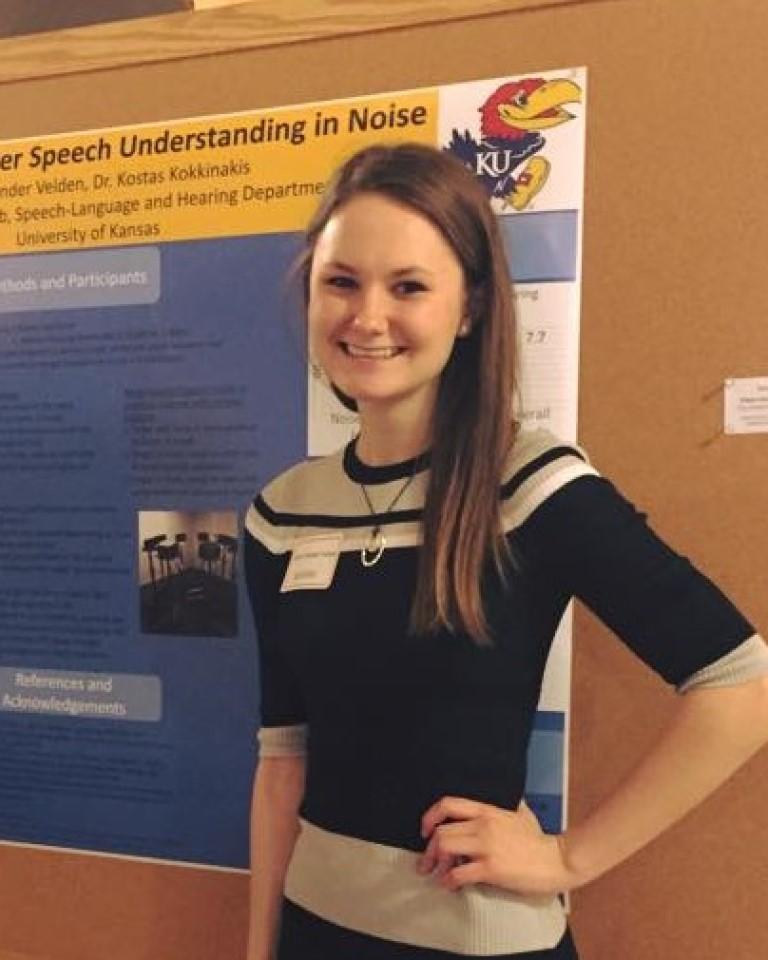Eileen Vander Velden

STUDENT SPOTLIGHT | MAY 2016
Department: I’m majoring in Speech-Language and Hearing Sciences and Disorders with a minor in Dance. I’ll be graduating this month (May 2016)!
Describe your work in a few sentences that we can all understand: My research looks at the use of modeling in order to help improve the hearing experiences of binaural prostheses users (people who wear two hearing aids or two cochlear implants). The model aims to help subjects understand speech within background noise, one of the primary problems faced by users of these devices.
Q: Who mentors your project?
A: Dr. Kostas Kokkinakis, an Assistant Professor in the SPLH department, has been my mentor for the past two years within the Electrical Hearing Lab.
Q: What surprised you about doing research?
A: To be honest, I was surprised at how much interaction I had with people. When I got started, I didn’t know what to expect and was just trying to be open to the experience. I had this idea that I’d be sitting in front of a computer and analyzing numbers. While there was some of this, I spent a lot of my time meeting with my mentor and peers in the lab, and running trials with subjects. I love interacting with people. Luckily, this experience showed me that research does not equate to sitting in a lab and never talking to anyone, which I think is a bad reputation that many students associate with research. I was able to really get to know the people that I tested. Plus, knowing that my results could affect the way that hard-of-hearing and Deaf people interact in the future is super fulfilling.
Q: What did you find most challenging about getting involved in or doing your project? What advice would you offer to students facing similar challenges?
A: I think the most challenging part of my research was coming to a competent understanding of all of the current literature, and the concepts and foundation of what we were testing. My mentor had a clear idea of the way in which we needed to test, but before I could jump right in, I needed to have the background in order to know what I was doing. There was a steep learning curve and I spent many weeks on literature review. Although this process was challenging, it was also very rewarding. I thoroughly learned an enormous amount of material that I would not have within the context of my courses.
I would advise students facing similar challenges to ask their mentor questions. I would go into meetings with two pages worth of questions and sticky notes on articles asking about vocabulary and concepts I was unfamiliar with. My mentor was supportive throughout the entire process and never made me feel like my questions were silly or dumb. I’d advise students to take their time through the process—it will make their research more meaningful (and easier to present/understand) in the end!
Q: What do you like most about your project?
A: I like that the results could lead to tangible and important advances in hearing technology. Through further research and publishing, we hope that cochlear implant manufacturers can code these models into the technology and improve the hearing experiences of future cochlear implant users. It’d be great to know that the research we did could significantly impact the lives of those using devices and allow them to be more social.
Q: What advice would you give to a friend wanting to get involved in doing research or creative work?
A: I would tell them to take advantage of every opportunity that research presents! I’ve been fortunate enough to be able to receive an Undergraduate Research Award, complete the Research Experience certificate, and present my research within the SPLH department and at the Kansas Capitol. All of these experiences were very worthwhile and helped me to be able to share the research with others. Completing undergraduate research and having these experiences also greatly enhanced my graduate school applications and gave me new perspective to talk about within my interviews. My experiences in undergraduate research are some of my favorites in my time at the University of Kansas. I would advise anyone who is even considering doing research to do it. It is definitely worth the effort. You will learn so much through the process and it will make you a stronger student.
Q: How do you spend your time when you’re not working on your research?
A: When I’m not working on research, I work as an RA in Templin Hall and love spending time with first year students. I also enjoy dancing, reading, singing, cooking, and of course, hanging out with friends and family.